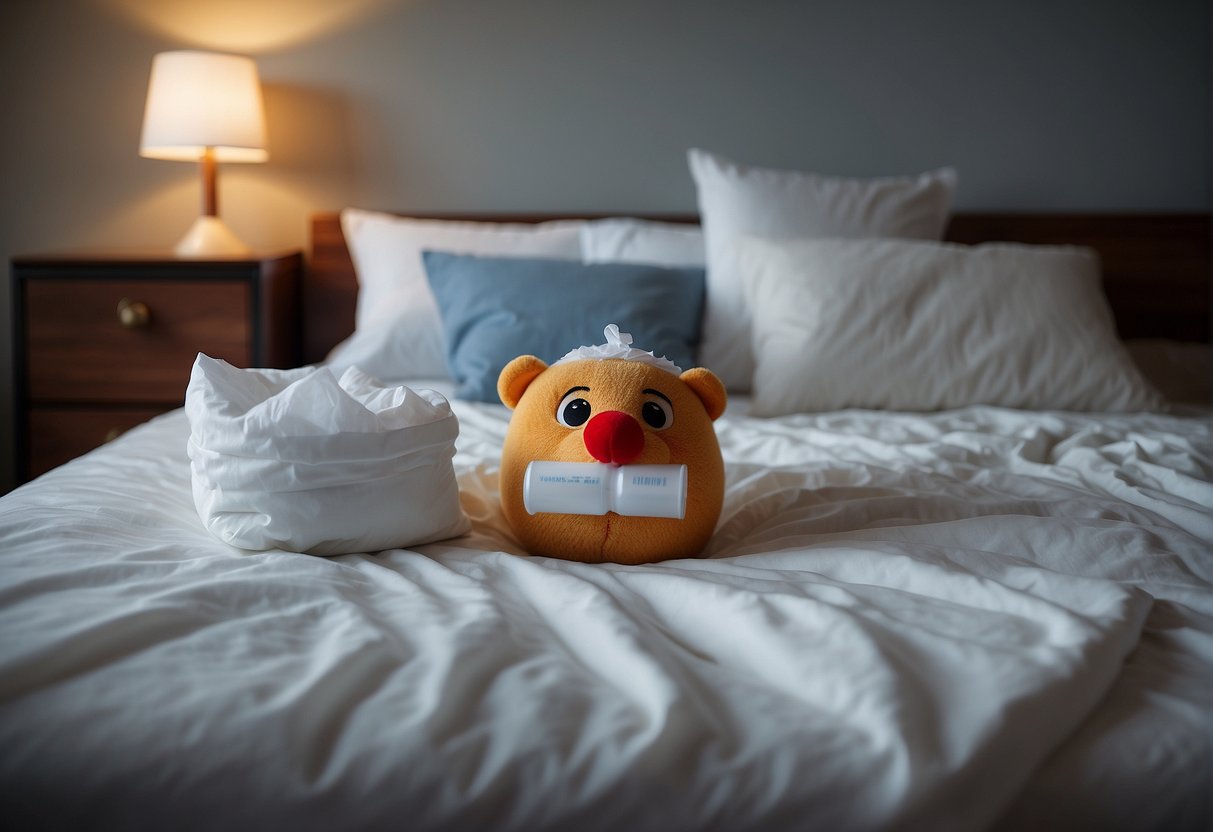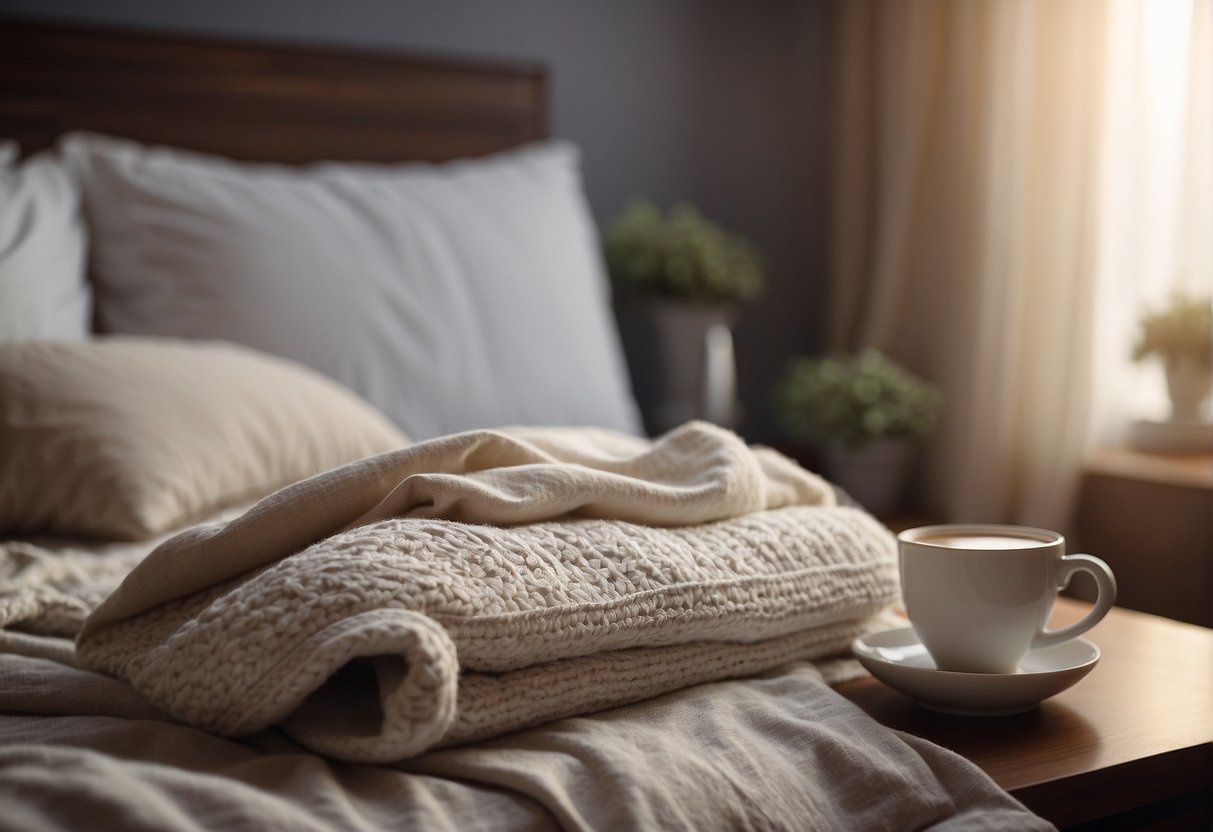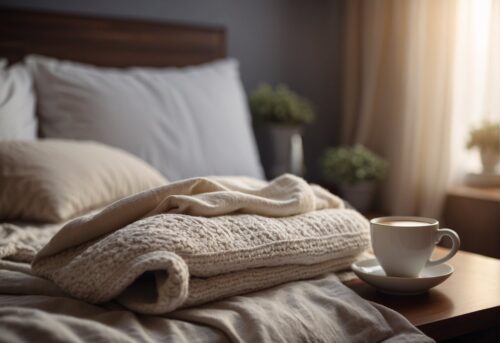The common cold is a viral infection that affects the upper respiratory system. It is caused by different types of viruses and is highly contagious. The symptoms of a cold can range from mild to severe, and they usually develop within two to three days of exposure to the virus. The most common symptoms of a cold include:
- Runny or stuffy nose
- Sore throat
- Cough
- Sneezing
- Fatigue
- Headache
- Body aches
- Low-grade fever
If you are experiencing any of these symptoms, it is likely that you have a cold. It is important to rest and take care of yourself to help your body fight off the infection.

Table of Contents
How a Cold Affects Sleep Quality
A cold can make it difficult to sleep, and it can also affect the quality of your sleep. The congestion in your nose and sinuses can make it hard to breathe, which can lead to snoring or sleep apnea. This can disrupt your sleep and make you feel tired during the day.
Additionally, coughing can keep you up at night and make it hard to fall asleep. The discomfort caused by a sore throat or body aches can also make it hard to get comfortable and fall asleep.
Your immune system is working hard to fight off the virus, which can also make you feel tired and run down. It is important to get plenty of rest to help your body recover and fight off the infection.
Creating a Comfortable Sleep Environment

When you have a cold, getting a good night’s sleep is essential for a speedy recovery. One of the most important factors in achieving quality sleep is creating a comfortable sleep environment. Here are some tips to help you create a comfortable sleep environment when you have a cold.
Regulating Room Temperature
The temperature of your room can significantly affect your sleep quality. If your room is too warm, it can cause you to feel uncomfortable and restless, while a room that is too cold can make you feel even more congested. Ideally, you should aim to keep your bedroom temperature between 60 and 67 degrees Fahrenheit.
To regulate the temperature of your room, you can use a thermostat or an adjustable bed that allows you to control the temperature. You can also use a humidifier to add moisture to the air and prevent your nasal passages from drying out.
Choosing the Right Mattress and Pillows
The right mattress and pillows can make a big difference in your sleep quality. If you’re a hot sleeper, you may want to consider a mattress that is designed to keep you cool, such as a memory foam mattress or a mattress with a cooling gel layer.
Pillows are also important for a comfortable sleep environment. If you have a cold, you may want to consider using a pillow that elevates your head to help reduce congestion. You can also use a pillow with a cooling gel layer to help regulate your body temperature.
When selecting a mattress and pillows, it’s important to consider your personal preferences and needs. A mattress topper can also be a great addition to your bed to provide extra comfort and support.
By regulating the temperature of your room and choosing the right mattress and pillows, you can create a comfortable sleep environment that will help you get the rest you need to recover from your cold.
Alleviating Cold Symptoms for Better Sleep
When you have a cold, getting a good night’s sleep can be challenging. Congestion, a runny nose, and a sore throat can make it difficult to breathe and sleep comfortably. Fortunately, there are several ways to alleviate cold symptoms so you can breathe easier and get the rest you need.
Using Nasal Decongestants
Nasal decongestants can help relieve congestion and open up your nasal passages, making it easier to breathe. There are several types of nasal decongestants available, including nasal sprays, nasal strips, and mentholated gels.
Nasal sprays containing oxymetazoline or phenylephrine can provide quick relief from nasal congestion. However, they should only be used for a few days at a time, as prolonged use can lead to rebound congestion.
Nasal strips can be helpful for those who snore due to nasal congestion. They work by physically pulling open the nostrils, allowing more air to flow through.
Mentholated gels, such as Vicks VapoRub, can also help relieve congestion and make it easier to breathe. Simply apply a small amount to your chest or under your nose before bed.
Home Remedies to Ease Breathing
In addition to using nasal decongestants, there are several home remedies that can help ease breathing and alleviate cold symptoms. Saline sprays and rinses can help moisturize the nasal passages and flush out mucus. Simply mix a quarter teaspoon of salt with eight ounces of warm water and use a bulb syringe or neti pot to administer the saline solution.
Steam can also be helpful in relieving congestion. Take a hot shower before bed, or fill a bowl with hot water and inhale the steam for a few minutes.
Adding eucalyptus oil to your steam or using a mentholated rub can also help open up your sinuses and make it easier to breathe. Just be sure to follow the instructions carefully and avoid getting the products in your eyes.
Finally, keeping your head elevated while sleeping can help alleviate congestion and make it easier to breathe. Use extra pillows to prop yourself up, or invest in a wedge pillow designed specifically for this purpose.
Medications and Treatments
If you’re struggling to sleep due to a cold, there are a few medications and treatments you can try to help alleviate your symptoms and get some much-needed rest. Here are some options to consider:
Over-the-Counter Medications
Over-the-counter medications can be a good option for managing cold symptoms, but it’s important to choose the right ones for your needs. Some common options include pain relievers like acetaminophen or NSAIDs, which can help reduce fever and relieve aches and pains.
Cough suppressants and cough medicines can help control coughing, while decongestants and antihistamines can help alleviate congestion and runny nose. However, it’s important to read the labels carefully and follow the instructions closely to avoid any potential side effects.
Natural and Alternative Remedies
If you prefer natural or alternative remedies, there are a few options to consider as well. Chicken soup is a classic remedy that can help soothe a sore throat and reduce congestion. Herbal tea, such as chamomile or peppermint, can also help calm your nerves and promote relaxation.
Aromatherapy, using essential oils like eucalyptus or lavender, can help open up your airways and promote better breathing. Finally, melatonin supplements can help regulate your sleep-wake cycle and promote better sleep, but it’s important to talk to your doctor before trying any new supplements.
Lifestyle Adjustments to Improve Sleep with a Cold
If you have a cold, it can be difficult to get a good night’s sleep. However, there are some lifestyle adjustments you can make to help improve your sleep quality.
Diet and Hydration
What you eat and drink can have a significant impact on your ability to sleep with a cold. Here are some tips to help you improve your diet and hydration:
- Drink plenty of fluids: Staying hydrated is important when you have a cold, as it can help loosen mucus and relieve congestion. Try to drink at least 8-10 glasses of fluid per day, including water, tea, and other non-caffeinated beverages.
- Avoid caffeine and alcohol: Both caffeine and alcohol can interfere with your ability to fall asleep and stay asleep. Try to avoid these substances, especially in the evening.
- Drink hot water with baking soda and iodide-free salt: This can help relieve congestion and soothe a sore throat.
Sleep Hygiene and Schedules
Good sleep hygiene and a regular sleep schedule can also help you sleep better with a cold. Here are some tips to help you improve your sleep hygiene and schedule:
- Stick to a regular sleep schedule: Try to go to bed and wake up at the same time every day, even on weekends.
- Create a relaxing bedtime routine: Take a warm bath, read a book, or listen to calming music before bed to help you relax and fall asleep faster.
- Keep your bedroom cool and dark: A cool, dark bedroom can help you sleep better. Use blackout curtains or an eye mask to block out light, and keep the temperature between 60-67 degrees Fahrenheit.
- Practice good sleep hygiene: Avoid using electronic devices in bed, and make sure your bedroom is quiet and comfortable.
When to Consult a Healthcare Provider
If you have a cold, it’s important to monitor your symptoms and take steps to manage them. While most colds will go away on their own within a week or two, there are some cases where you should seek medical attention.
You should consult a healthcare provider if:
- Your fever is above 100.4°F (38°C) or lasts for more than three days.
- You experience severe or persistent pain, inflammation, or swelling.
- You have difficulty breathing or shortness of breath.
- You have a persistent cough or chest pain.
- Your symptoms worsen or do not improve after a week.
- You have a weakened immune system due to a medical condition or medication.
Your healthcare provider can help determine the best course of treatment based on your symptoms and medical history. They may recommend over-the-counter medications, prescribe antibiotics if a bacterial infection is present, or provide other treatments to help manage your symptoms.
In some cases, a cold can lead to complications such as bronchitis or pneumonia. If you experience any of the following symptoms, seek medical attention immediately:
- Difficulty breathing or shortness of breath
- Chest pain or pressure
- Confusion or disorientation
- Bluish lips or face
- Severe or persistent vomiting
Remember, it’s always better to err on the side of caution when it comes to your health. If you’re unsure whether you should seek medical attention, consult with your healthcare provider.
Frequently Asked Questions
What is the best sleeping position to alleviate coughing during a cold?
The best sleeping position to alleviate coughing during a cold is to sleep on your side. This position helps to open up your airways and reduce coughing. Sleeping on your back can make coughing worse, while sleeping on your stomach can cause neck and back pain.
What are effective ways to relieve a stuffy nose before bedtime?
To relieve a stuffy nose before bedtime, you can try using a saline nasal spray or a nasal irrigation system. You can also use a humidifier in your bedroom to add moisture to the air, which can help to relieve congestion. Additionally, you can try using a warm compress on your sinuses to help open them up.
What non-medicinal methods can help improve sleep quality while having a cold?
Non-medicinal methods that can help improve sleep quality while having a cold include staying hydrated, using a humidifier, and elevating your head while sleeping. Additionally, you can try taking a warm bath or shower before bed to help relax your body and promote better sleep.
How can I soothe a sore throat to sleep better at night?
To soothe a sore throat and sleep better at night, you can try drinking warm liquids such as tea with honey or warm water with lemon and honey. You can also try gargling with salt water to help reduce inflammation and soothe your throat.
Is it advisable to sleep with an open window when suffering from a cold?
It is not advisable to sleep with an open window when suffering from a cold. Cold air can irritate your airways and make your symptoms worse. It is better to keep your bedroom at a comfortable temperature and use a humidifier to add moisture to the air.
What are the reasons a cold may feel worse during the night and how can it affect sleep?
A cold may feel worse during the night due to several reasons, including postnasal drip, coughing, and difficulty breathing. These symptoms can disrupt your sleep and make it harder to get the rest you need to recover. To help alleviate these symptoms, try using a humidifier, elevating your head while sleeping, and using non-medicinal treatments such as saline nasal sprays or warm compresses.



